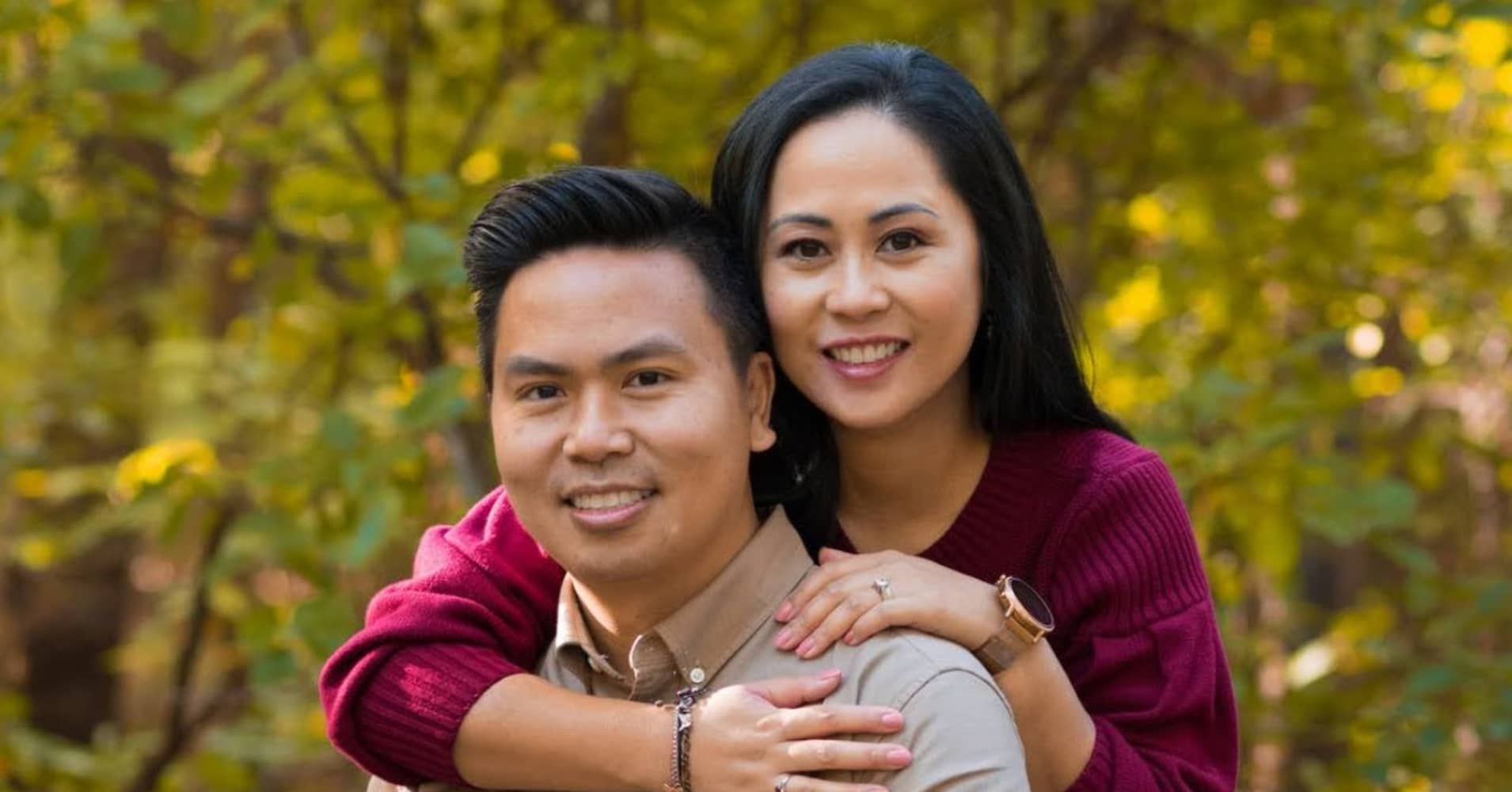
HOW TO OVERCOME A 'SCARCITY MENTALITY' AND FEEL FINANCIALLY SECURE, ACCORDING TO A FRUGAL MILLIONAIRE COUPLE
Jonathan and Jacqueline Sanchez pushed their net worth over $1 million in 2021, through a combination of savings, investments and real estate equity.
But it took awhile for Jonathan, who grew up in a frugal, single-parent household to feel fully financially secure, despite the couple's millionaire status.
"It took a lot of psychological reflecting to get to a place where I wasn't feeling guilty about spending money," he tells CNBC Make It. "I didn't have money growing up, and that created a scarcity mentality. It took some time to realize that we had money saved and money coming in and to feel comfortable saying, 'Hey, we're OK.'"
Jonathan and Jacqueline — ages 40 and 41, respectively — are the co-founders of financial literacy business Parent Portfolio, which Jacqueline now runs full-time after leaving her career in pharmacy. Jonathan contributes to the business while still working his day job as a software engineer. Jonathan helms the couple's real estate investments. Jacqueline manages the family books.
If it sounds like they have a lot on their plate, it's because they do. But the diversity of their income sources, as well as their commitment to being frugal, are some of the major reasons the couple now lives — and spends — comfortably. Here are their three keys to financial security.
1. An ample emergency fund
Jonathan derives a huge sense of security from the knowledge that his wife has the budget under control. "She does all the books, and has done a really good job having these buckets of money," he says. "So if anything was to happen, we're actually OK."
But for how long?
"We have cash reserves that, if we were to readjust our budgets and tighten our belts a little bit, we could survive 18 to 24 months with what we have in savings, if something catastrophic were to happen," Jacqueline says.
That's above and beyond the three to six months' worth of expenses recommended by many financial experts. But, importantly, it includes a caveat that many savers overlook. When building an emergency fund, you don't necessarily have to think of what a month's worth of living expenses looks like right now. Rather, think of how you'd live in the case of a real financial emergency.
"If you have a job loss, you'd make some changes. You'd probably cut your gym membership and get rid of your subscriptions, for instance," Christine Benz, director of personal finance and retirement planning at Morningstar, previously told Make It. "Think about the bare minimum you'd need to get by."
2. Diversified income sources
In the investing world, advisors generally recommend spreading money in your portfolio across a wide array of assets. In doing so, you help mitigate the risk that a major loss in one particular investment could derail your plans.
The same concept applies to sources of income. If your paycheck represents every dollar you have coming in, a job loss is a 100% loss of income. But for the Sanchezes, if Jonathan lost his day job, the couple could still count on income from their three rental properties and cash generated by their financial coaching business.
Having a diversified group of income sources allows the couple to feel financially secure, even as they go through the usual ups and downs of launching and growing an online business.
It's an important feeling to have, especially if your business is subject to the opaque algorithms of internet search engines, Jacqueline says. "If you can roll with it, then you can be secure."
In other words, the Sanchezes can start new ventures with the knowledge that they have the ability to rely on other sources for income if need be.
"Going into real estate, opening these businesses, making big life changes — they were still very calculated," Jacqueline says. "We have Plan Bs and Plan Cs just in case."
3. Skills and frugality
One of those plans involves Jacqueline, who effectively took a pay cut to run the website full time, going back to work.
"We still have the skills that we learned in college. I went to pharmacy school. I still keep my license active," Jacqueline says. "And for me, that's kind of a security blanket. I can always go back into the workforce should the need arise."
In the meantime, the couple maintains a frugal lifestyle and lives well below their means in the relatively affordable Omaha, Nebraska.
Jonathan says he never spends on fast fashion or new, trendy clothes, opting instead to maintain a simple wardrobe that he takes care of. Jacqueline says she still has outfits she wore in high school.
"If you come to our house you'll see furniture that I grew up with in California," Jacqueline says. "We've just taken care of things. We're not being wasteful. In that sense, frugality as a lifestyle is very much us."
Want to be a successful, confident communicator? Take CNBC's new online course Become an Effective Communicator: Master Public Speaking. We'll teach you how to speak clearly and confidently, calm your nerves, what to say and not say and body language techniques to make a great first impression. Sign up today and use code EARLYBIRD for an introductory discount of 30% off through July 10, 2024.
Plus, sign up for CNBC Make It's newsletter to get tips and tricks for success at work, with money and in life.
